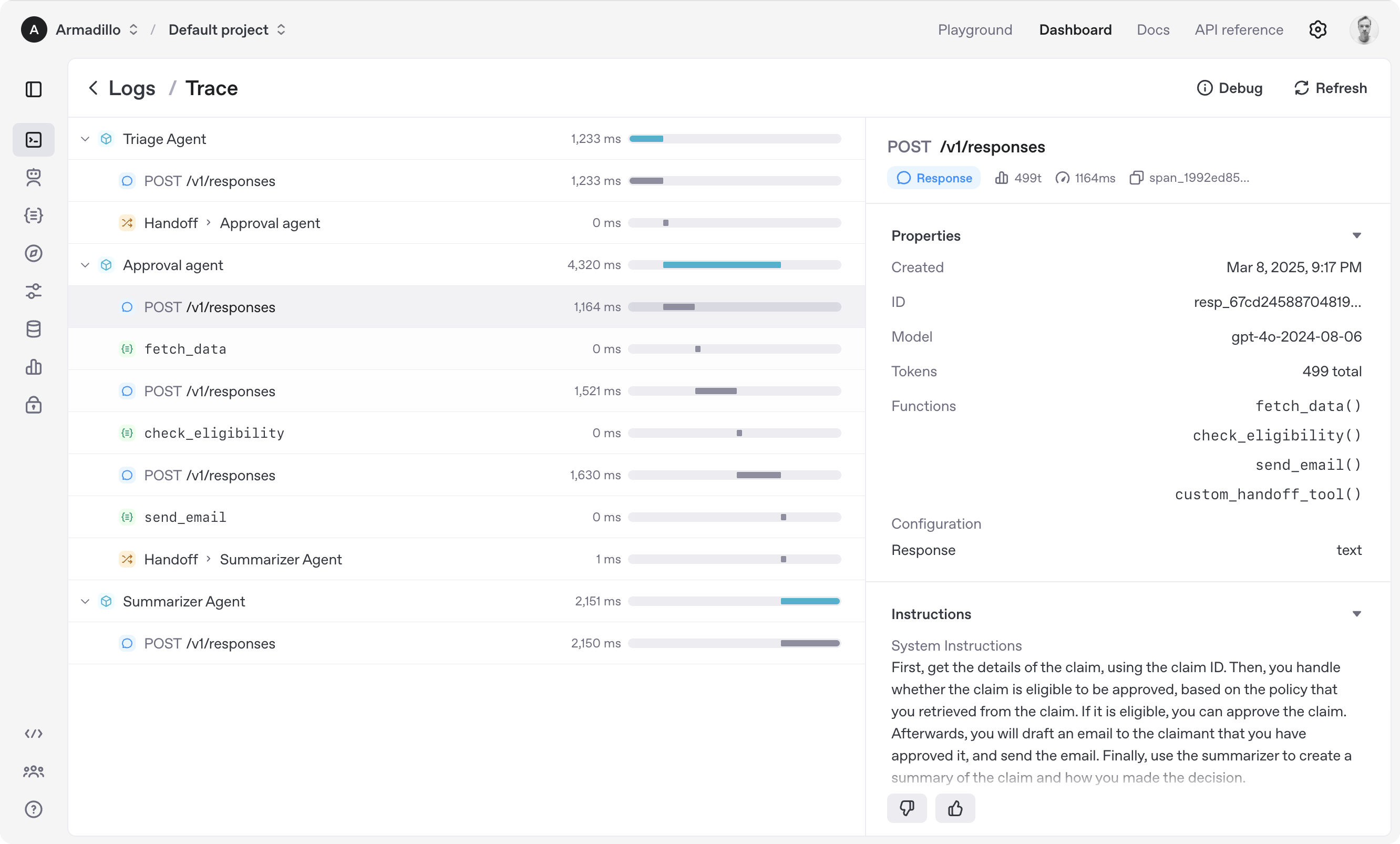# openai-building-agents
Agents
======
Learn how to build agents with the OpenAI API.
Agents represent **systems that intelligently accomplish tasks**, ranging from executing simple workflows to pursuing complex, open-ended objectives.
OpenAI provides a **rich set of composable primitives that enable you to build agents**. This guide walks through those primitives, and how they come together to form a robust agentic platform.
Overview
--------
Building agents involves assembling components across several domains—such as **models, tools, knowledge and memory, audio and speech, guardrails, and orchestration**—and OpenAI provides composable primitives for each.
|Domain|Description|OpenAI Primitives|
|---|---|---|
|Models|Core intelligence capable of reasoning, making decisions, and processing different modalities.|o1, o3-mini, GPT-4.5, GPT-4o, GPT-4o-mini|
|Tools|Interface to the world, interact with environment, function calling, built-in tools, etc.|Function calling, Web search, File search, Computer use|
|Knowledge and memory|Augment agents with external and persistent knowledge.|Vector stores, File search, Embeddings|
|Audio and speech|Create agents that can understand audio and respond back in natural language.|Audio generation, realtime, Audio agents|
|Guardrails|Prevent irrelevant, harmful, or undesirable behavior.|Moderation, Instruction hierarchy|
|Orchestration|Develop, deploy, monitor, and improve agents.|Agents SDK, Tracing, Evaluations, Fine-tuning|
|Voice agents|Create agents that can understand audio and respond back in natural language.|Realtime API, Voice support in the Agents SDK|
Models
------
|Model|Agentic Strengths|
|---|---|
|o1 and o3-mini|Best for long-term planning, hard tasks, and reasoning.|
|GPT-4.5|Best for agentic execution.|
|GPT-4o|Good balance of agentic capability and latency.|
|GPT-4o-mini|Best for low-latency.|
Large language models (LLMs) are at the core of many agentic systems, responsible for making decisions and interacting with the world. OpenAI’s models support a wide range of capabilities:
* **High intelligence:** Capable of [reasoning](/docs/guides/reasoning) and planning to tackle the most difficult tasks.
* **Tools:** [Call your functions](/docs/guides/function-calling) and leverage OpenAI's [built-in tools](/docs/guides/tools).
* **Multimodality:** Natively understand text, images, audio, code, and documents.
* **Low-latency:** Support for [real-time audio](/docs/guides/realtime) conversations and smaller, faster models.
For detailed model comparisons, visit the [models](/docs/models) page.
Tools
-----
Tools enable agents to interact with the world. OpenAI supports [**function calling**](/docs/guides/function-calling) to connect with your code, and [**built-in tools**](/docs/guides/tools) for common tasks like web searches and data retrieval.
|Tool|Description|
|---|---|
|Function calling|Interact with developer-defined code.|
|Web search|Fetch up-to-date information from the web.|
|File search|Perform semantic search across your documents.|
|Computer use|Understand and control a computer or browser.|
Knowledge and memory
--------------------
Knowledge and memory help agents store, retrieve, and utilize information beyond their initial training data. **Vector stores** enable agents to search your documents semantically and retrieve relevant information at runtime. Meanwhile, **embeddings** represent data efficiently for quick retrieval, powering dynamic knowledge solutions and long-term agent memory. You can integrate your data using OpenAI’s [vector stores](/docs/guides/retrieval#vector-stores) and [Embeddings API](/docs/guides/embeddings).
Guardrails
----------
Guardrails ensure your agents behave safely, consistently, and within your intended boundaries—critical for production deployments. Use OpenAI’s free [Moderation API](/docs/guides/moderation) to automatically filter unsafe content. Further control your agent’s behavior by leveraging the [instruction hierarchy](https://openai.github.io/openai-agents-python/guardrails/), which prioritizes developer-defined prompts and mitigates unwanted agent behaviors.
Orchestration
-------------
Building agents is a process. OpenAI provides tools to effectively build, deploy, monitor, evaluate, and improve agentic systems.

|Phase|Description|OpenAI Primitives|
|---|---|---|
|Build and deploy|Rapidly build agents, enforce guardrails, and handle conversational flows using the Agents SDK.|Agents SDK|
|Monitor|Observe agent behavior in real-time, debug issues, and gain insights through tracing.|Tracing|
|Evaluate and improve|Measure agent performance, identify areas for improvement, and refine your agents.|EvaluationsFine-tuning|
Get started
-----------
Get started by installing the [OpenAI Agents SDK for Python](https://github.com/openai/openai-agents-python) via:
```text
pip install openai-agents
```
Explore the [repository](https://github.com/openai/openai-agents-python) and [documentation](https://openai.github.io/openai-agents-python/) for more details.
 Sign in with Wallet
Sign in with Wallet

